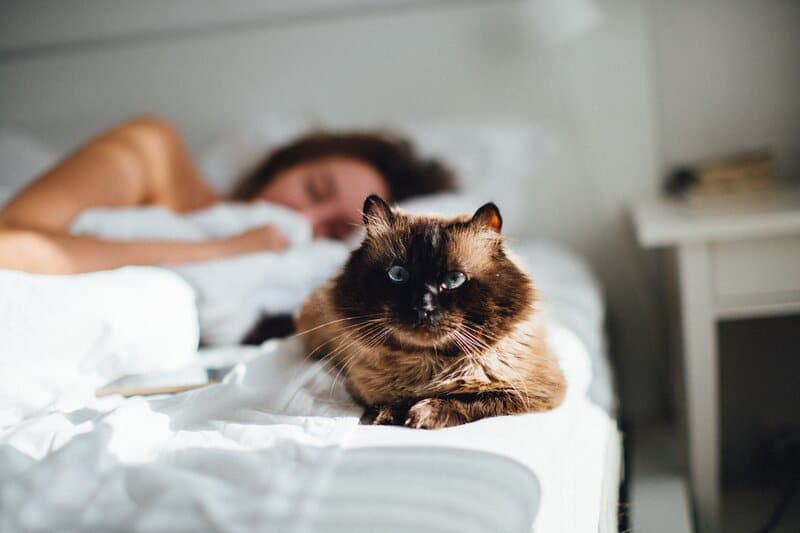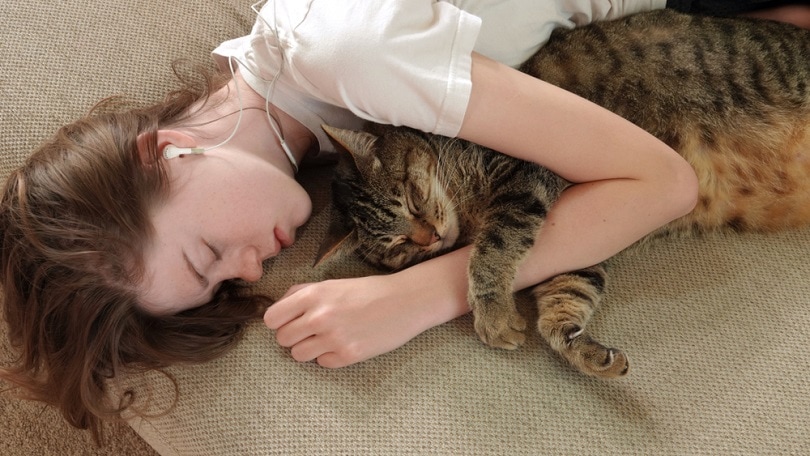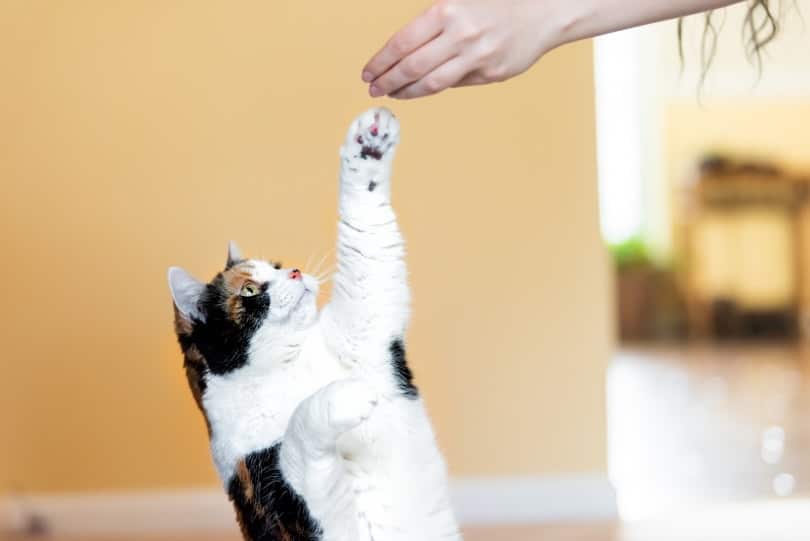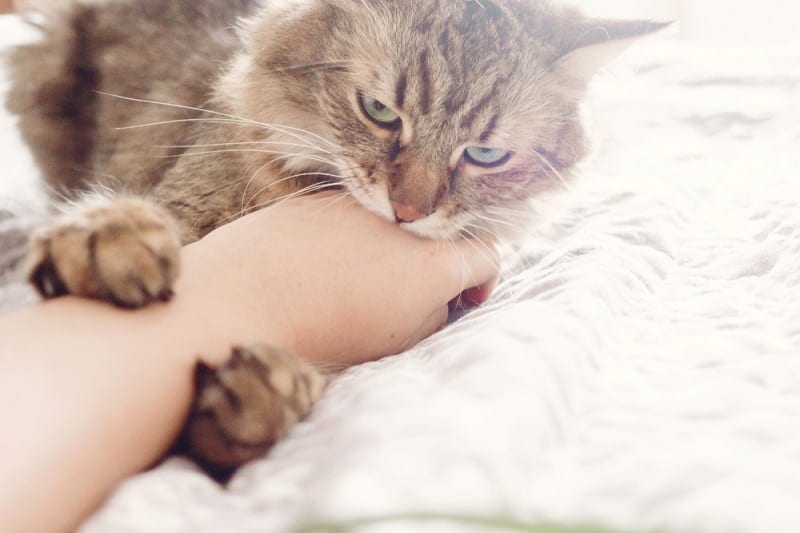Click to Skip Ahead
It’s natural for cats to bite, and there are various reasons why your kitty might suddenly bite, seemingly unprovoked.
Cats are born with innate predatory instincts, so much so that aggressive actions like biting show up naturally during their play sessions. However, if your kitty starts to become feisty much more often, it constitutes a behavior problem that you need to address. While it is vital to allow and encourage this vital instinct for your kitty, there should be a fine line between participating in stimulating play and allowing aggressive behavior, especially when you are dead asleep.
So, why do cats nibble on their sleeping parents? What do they try to communicate by biting? Before addressing this, here are important terms you need to know.
- Problem Behavior: Problem behaviors in cats are continuous behaviors that hinder relationships between owners and their pets. They include the tendency to violence, anxiety, scratching on furniture, biting, and deliberately avoiding the litter box.
- Nibble: Small, harmless bites.
- Mouthing: Instinctive behavior that involves cats touching surfaces or objects with the mouth.
- Crepuscular: Appearing to be active at night.
The 5 Reasons Why Your Cat Bites You While You Sleep
1. Display of Aggression
While bites are a fact of life for pet owners, waking up to tooth marks on your skin should be alarming. However, the magnitude of the problem depends on the bite’s severity. While some bites can be subtle and harmless, it is an aggressive bite if it is deep and bloody and accompanied by other signs like hissing sounds and growls.
Research shows that felines are aggressive animals, and they could bite unprovoked. However, external factors like roughhousing, illnesses, and threats from other house pets could trigger some signs of hostility.
But why bite when sleeping? If your cat is biting places like the feet when you are asleep, it’s because the feet mimic their enemies’ movement, prompting the cat to attack.

2. Demanding Play
Are you wondering why your cat is biting you? Could they be waking you up to play?
First, cat parents should understand that felines are crepuscular, meaning they are biologically wired to be up most of the night while everyone else is asleep. So, a cat that disrespects your sleeping schedule could be bored while you are asleep, wondering when you will wake up.
Being social creatures, kitties love company, and they could be looking for a playmate. You are most likely to see this act in kittens because they tend to be more dependent and energized than grown cats.
Playing is an important part of keeping your cat mentally and physically engaged, and a great toy will make it much easier. We like Hepper's Catnip Stick Toys because they're sturdy enough to handle intense play and completely filled with organic catnip. You'll love the fun range of pastel colors and your cat will enjoy the prey-like shape!
At Catster, we’ve admired Hepper for many years and decided to take a controlling ownership interest so that we could benefit from the outstanding designs of this cool cat company!
3. To Alert You About Something
Interestingly, sleeping cats do not mean that they are “off the clock.” Felines are always on the lookout, even when they are asleep. This aspect makes them almost instantly aware of the slightest noise in the home.
Cats attribute this behavior to both their predator and hunting instincts, which is something they depend on to stay safe. Since these instincts are directly connected to a cat’s crepuscular nature, they are more likely to wake up before you during a commotion. And if they do, they may bite you in an attempt to call your attention to something.
It is vital to watch their accompanying reactions to allow you to respond to the message they are trying to pass you. For instance, are they displaying agitation or restlessness, or are they trying to lead you somewhere else?

4. They Want to Get Fed
Is your cat well-fed and happy? A hungry kitty will disrupt your sleep by biting your face to ask for more food. However, such bites are usually gentle, but it’s a sign of aggression if it’s hurtful. Deep bites are an indicator of an angry, not hungry, cat.
5. Showing Affection
While most people associate biting with negative feelings, cats might bite out of love. Love bites are different from fearful or defensive bites meant to hurt you.
Such bites usually feel ticklish and quirky, and your cat may do it until you snuggle or pet them. They may nibble or mouth on places like the hands when you stop petting, which indicates that they don’t want you to take your hand off them.

How to Stop Your Cat From Biting You While You Sleep
Your sleep is vital, and your kitty shouldn’t prevent you from getting quality sleep. Here’s how to prevent your cat from biting you when asleep.
1. Spend Quality Time With Your Cat
Kitties require much more attention than you might expect. While they often appear as independent creatures, they still crave attention, affection, and love.
One way of showing affection to your feline friend is by spending one-on-one quality time with them. As a responsible cat parent, take time to cuddle, pet, stroke, and massage them whenever you can.
2. Feed Them Before Going to Bed
Do you want your kitty to sleep through the night and allow you a peaceful rest as well? If so, feed them shortly before bedtime because, just like humans, cats are more likely to sleep after a satisfying meal.
Another way to minimize late-night interruptions is to invest in automatic cat feeders. You can set these items to release a handful of dry foods at specific times. Therefore, your cat will be able to reach out for food on their own if they wake up hungry in the middle of the night.
3. Make Your Cat Exercise in the Evening to Wear Them Out
Most cats are usually bored out of their skulls, making cat owners end up with stir-crazy and biting cats at night. To avoid nighttime disruptions, it would be best if you used up the kitty’s energy reserves with plenty of activity moments before bed.
Think of activities as a form of recreation, fun, a challenge, and an opportunity to spend time and bond with your feline friend. Engage them in their favorite interactive game, such as cat gyms with lots of climbing and clawing, to tire them.

4. Set Up a Camera to Document the Behavior
Keep a diary of your kitty’s biting behavior, or set up a camera to help you understand the cause and reason for this undesirable behavior. By doing so, you’ll be able to study your feline friend better, understand them, and get a clear picture of what prompts them to bite.
5. Leave Your Cat in a Separate Room
If possible, let your cat have a separate sleeping room and close your bedroom door to deny them entry at night. Cats are territorial, and the more you allow them into your bed, the more they take charge of it. This will make keeping them out, when you desperately need to, difficult.
Giving your kitty a separate sleeping area will automatically make your sleeping space a cat-unfriendly area and save you from night bites.
6. Offer Alternatives and Establish Clear Limits
Be careful to watch out for biting signs in your cat, no matter how subtle they could be. It would be best to discourage such traits and never give them the impression that it is okay to bite you.
It’s vital to teach your kitty that biting is bad, especially at a young age, because it is easier to train and correct kittens’ destructive behaviors than adults’. Find toys for your cat to practice nibbling on and reward them for doing so to encourage the behavior on the toys. Biting is self-soothing, so the reward for biting the toys should only be given the first few times.
It’s equally essential to make it physically impossible for your kitty to deliver unprovoked hard bites. However, avoid punishing them because cats don’t always bite to hurt, but they could be communicating or demanding your attention.
Again, because biting is self-soothing, you should aim to establish the limits before this happens. If you allow a cat to bite you when awake and moreover give your attention after the bite, the likelihood of this behavior repeating during your sleep when your attention is needed is actually very high. When it comes to bites, the message should be clear: It is not allowed and not okay.

Conclusion
Cat parents should always be on the lookout for aggressive traits like biting and find ways to contain them. It would be best to check with your vet for help if the behavior persists. Most importantly, find a doctor to treat your deep, bloody bites.
The good thing is that it is easy to contain a kitty that bites you merely for your attention. Having a bite-free night shouldn’t be hard now that you have the solutions with you.
See also:
- Can Cats Be Ticklish? Facts & FAQ
- Why Does My Cat Attack Me and No One Else? 7 Reasons for This Behavior
- Why Does My Kitten Bite Me? 5 Common Reason
Featured Image: Bogdan Sonjachnyj, Shutterstock












